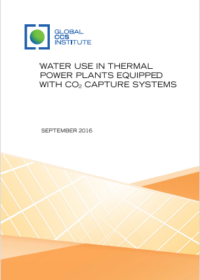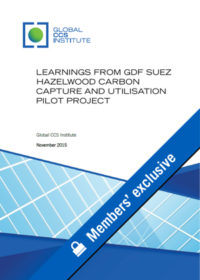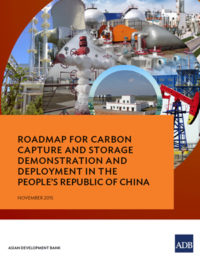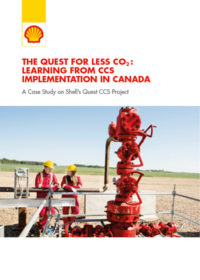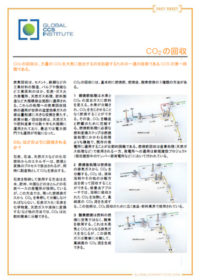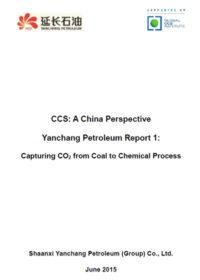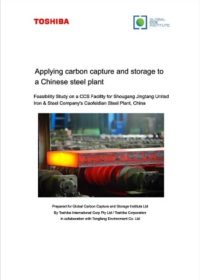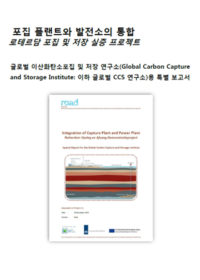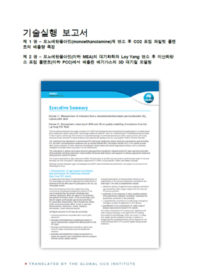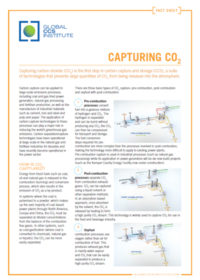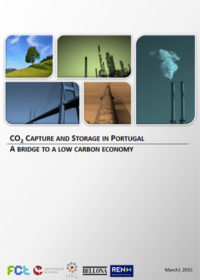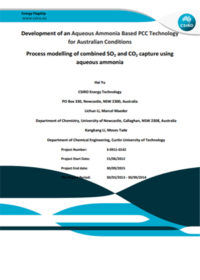Resources
Publications
Our publications, reports and research library hosts over 500 specialist reports and research papers on all topics associated with CCS.
View our Publication Library Disclaimer.
Filter by
Water use in thermal power plants equipped with CO2 capture systems
28th September 2016
Topic(s): CO2 capture
Addition of a CO2 capture system to an existing power station has some impact on water consumption. CO2 capture systems require additional water for cooling and process make-up, which can be of concern, particularly in areas of water scarcity. During the past decade, a number of relevant studies have been published that estimate the increase in water use when a capture system is added to Pulverised Coal (PC), Natural Gas Combined Cycle (NGCC) and Integrated Gasifier Combined Cycle (IGCC) power production facility.
The report, authored by the Institute’s capture experts Guido Magneschi, Ron Munson and Tony Zhang, provides insights about how adding a CO2 capture system to a power plant impacts the volume of water withdrawn and consumed. The results of this analysis serve to dispel myths about the use of water in CCS systems. Specifically, they challenge the misleading assertion that CCS systems will double water consumption, which is often reported in papers and articles.
On the contrary, analyses of available data indicate that for power plants using wet-recirculating cooling systems, the increase in actual water consumed varies from approximately 20 per cent to 60 per cent, depending on the capture technology. For once-through cooling systems the increase can be negligible, or even negative when water recovery options are implemented. Water use estimates cannot be generalised, and are very dependent on the power plant type, the CO2 capture technology and the cooling system used.
Disclaimer
The content within the Global CCS Institute Publications, Reports and Research Library is provided for information purposes only. We make every effort and take reasonable care to keep the content of this section up-to-date and error-free. However, we make no claim as to its accuracy, currency or reliability.
Content and material featured within this section of our website includes reports and research published by third parties. The content and material may include opinions and recommendations of third parties that do not reflect those held by the Global CCS Institute.
Learnings from GDF SUEZ Hazelwood carbon capture and utilisation pilot project
25th February 2016
Topic(s): Carbon capture use and storage (CCUS), CO2 capture, Engineering and project delivery
The Hazelwood Carbon Capture and Utilisation Pilot Project enabled one of the largest post-combustion carbon capture plants to be installed on a coal-fired power station in Australia. While it is only a pilot scale demonstration plant, this project has strategic significance to the development of carbon capture and storage (CCS) in Australia. Valuable experiences have been achieved through ‘learning by doing’, including funding, management, training, equipment, operation etc. The report endeavours to share those experiences and knowledge.
Knowledge sharing is a key objective of the Global Carbon Capture and Storage Institute (the Institute). A key goal of the Institute is to work with industry partners to share knowledge acquired in the implementation of CCS projects. This report is a collaboration between GDF SUEZ Australian Energy, the operator of the Hazelwood Power Station, and the Institute.
Disclaimer
The content within the Global CCS Institute Publications, Reports and Research Library is provided for information purposes only. We make every effort and take reasonable care to keep the content of this section up-to-date and error-free. However, we make no claim as to its accuracy, currency or reliability.
Content and material featured within this section of our website includes reports and research published by third parties. The content and material may include opinions and recommendations of third parties that do not reflect those held by the Global CCS Institute.
Roadmap for carbon capture and storage demonstration and deployment in the People’s Republic of China
2nd December 2015
Topic(s): Carbon capture use and storage (CCUS), CO2 capture, CO2 storage, CO2 utilisation, Domestic policy, Policy law and regulation
This Roadmap provides information on how China could achieve its climate goals through policy measures that encourage the deployment of CCS out to 2050. The work draws from economic modelling by experts at The Institute of Energy, Environment and Economy at Tsinghua University, and The International Institute for Applied Systems Analysis.
Additional Work Package Reports
- Road Map for Carbon Capture and Storage (CCS) Demonstration and Deployment: Work Package 1 Report - Review of CCS Roadmaps (March 2015)
- Road Map for Carbon Capture and Storage (CCS) Demonstration and Deployment: Work Package 4 Report - CCS Regulatory Framework for the People's Republic of China (March 2015)
- Road Map for Carbon Capture and Storage (CCS) Demonstration and Deployment: Work Package 5a Report and 5b Report - Opportunities for CCS Deployment in the People's Republic of China under Low Carbon Transformation Scenarios (Mar 2015)
- Road Map for Carbon Capture and Storage (CCS) Demonstration and Deployment: Component B - Oxy-Fuel Combustion Technology Assessment
Insights about this report, from Lawrence Irlam (Global CCS Institute Senior Adviser Policy & Economics), Tony Wood (the Grattan Institute’s Energy Program), and Annika Seiler (Finance Specialist (Energy) with the Asian Development Bank (ADB)) are available on the Global CCS Institute website.
Disclaimer
The content within the Global CCS Institute Publications, Reports and Research Library is provided for information purposes only. We make every effort and take reasonable care to keep the content of this section up-to-date and error-free. However, we make no claim as to its accuracy, currency or reliability.
Content and material featured within this section of our website includes reports and research published by third parties. The content and material may include opinions and recommendations of third parties that do not reflect those held by the Global CCS Institute.
The Quest for less CO2: learning from CCS implementation in Canada. A case study on Shell’s Quest CCS Project
18th November 2015
Topic(s): Carbon capture use and storage (CCUS), CO2 capture, CO2 storage
Shell presents this case study on the Quest Carbon Capture and Storage Project. By capturing and permanently storing CO2 from Shell’s oil sands operations, the Quest flagship project will reduce CO2 emissions by more than one million tonnes a year.
Disclaimer
The content within the Global CCS Institute Publications, Reports and Research Library is provided for information purposes only. We make every effort and take reasonable care to keep the content of this section up-to-date and error-free. However, we make no claim as to its accuracy, currency or reliability.
Content and material featured within this section of our website includes reports and research published by third parties. The content and material may include opinions and recommendations of third parties that do not reflect those held by the Global CCS Institute.
インスティテュートは、CCSに関する基本情報をまとめたFACT SHEETシリーズを作成した。「CO2の回収 」は、CO2の回収過程に焦点を当て概要をとりまとめたものである。
Japanese translation of Capturing CO2.
Disclaimer
The content within the Global CCS Institute Publications, Reports and Research Library is provided for information purposes only. We make every effort and take reasonable care to keep the content of this section up-to-date and error-free. However, we make no claim as to its accuracy, currency or reliability.
Content and material featured within this section of our website includes reports and research published by third parties. The content and material may include opinions and recommendations of third parties that do not reflect those held by the Global CCS Institute.
Yanchang Petroleum report 1: capturing CO2 from coal to chemical process
16th October 2015
Topic(s): Carbon capture use and storage (CCUS), CO2 capture
To promote the development of CCS in China, the Global CCS Institute and China National Development and Reform Commission (NDRC) held a joint carbon capture, utilisation and storage (CCUS) workshop in Yan’An China in July 2013. Out of this collaboration the Global CCS Institute has commissioned Yanchang Petroleum Group to produce four knowledge-sharing reports on its integrated CCS project.
This first report of the series discusses the capture aspects of Yanchang Petroleum CCUS Project. It highlights project achievements and lessons learned from the project.
Tony Zhang, Institute Senior Adviser for Capture, Asia-Pacific provides an overview of this report in an Insight available on the Global CCS Institute website.
Disclaimer
The content within the Global CCS Institute Publications, Reports and Research Library is provided for information purposes only. We make every effort and take reasonable care to keep the content of this section up-to-date and error-free. However, we make no claim as to its accuracy, currency or reliability.
Content and material featured within this section of our website includes reports and research published by third parties. The content and material may include opinions and recommendations of third parties that do not reflect those held by the Global CCS Institute.
Applying carbon capture and storage to a Chinese steel plant
27th August 2015
Topic(s): Carbon capture use and storage (CCUS), CO2 capture, Engineering and project delivery
The Global CCS Institute presents a feasibility study report on applying carbon capture and storage (CCS) to a steel plant in China. Toshiba was commissioned to conduct the study through its business partner Tongfang Environment in collaboration with Shougang Jingtang United Iron & Steel of China. The study examined the application of CCS onto the Caofeidian steel plant.
The report covers the concept of capturing CO2 from a Chinese steel plant, transportation and potential storage in an oilfield for enhanced oil recovery (EOR).
The study suggests that carbon capture in Chinese steel plants is a cost effective means of reducing carbon emissions compared with similar plants around the world.
This report is authored by Toshiba for the Global CCS Institute. Tony Zhang, Institute Senior Adviser for Carbon Capture, Asia-Pacific also provides an overview of the report in a new Insight available on the Global CCS Institute website.
Disclaimer
The content within the Global CCS Institute Publications, Reports and Research Library is provided for information purposes only. We make every effort and take reasonable care to keep the content of this section up-to-date and error-free. However, we make no claim as to its accuracy, currency or reliability.
Content and material featured within this section of our website includes reports and research published by third parties. The content and material may include opinions and recommendations of third parties that do not reflect those held by the Global CCS Institute.
포집 플랜트와 발전소의 통합. 로테르담 포집 및 저장 실증 프로젝트. 글로벌 이산화탄소포집 및 저장 연구소(Global Carbon Capture and Storage Institute: 이하 글로벌 CCS 연구소)용 특별 보고서
1st July 2015
Topic(s): Carbon capture use and storage (CCUS), CO2 capture
본 보고서는 마스플락터 발전소(MPP3)에 현재 존재하는 화력 1,070 MW 3기와 Rotterdam Opslag en Afvang Demonstratieproject(ROAD)의 새롭게 제안된 250 MW 등급 탄소 포집을 통합시키는 데 중점을 두고 있다. 탄소 포집 기술은 이산화탄소 포집 및 저장(CCS) 비용을 절감하기 위한 방대한 연구 주제와 다양한 간행물의 주제가 되어왔다. 그러나 주요 발전소와의 통합은 또한 CCS 체인의 효율성 및 조작성에 중요한 영향을 미치며 본질적으로 상당한 프로젝트 비용을 차지하게 된다
Korean translation of Integration of capture plant and power plant, Rotterdam Opslag en Afvang Demonstratieproject: special report for the Global Carbon Capture and Storage Institute
Disclaimer
The content within the Global CCS Institute Publications, Reports and Research Library is provided for information purposes only. We make every effort and take reasonable care to keep the content of this section up-to-date and error-free. However, we make no claim as to its accuracy, currency or reliability.
Content and material featured within this section of our website includes reports and research published by third parties. The content and material may include opinions and recommendations of third parties that do not reflect those held by the Global CCS Institute.
기술실행 보고서. 모노에탄올아민
4th June 2015
Topic(s): Carbon capture use and storage (CCUS), CO2 capture, Health safety and environment
기술실행 보고서
제 1 권 – 모노에탄올아민(monoethanolamine)계 연소 후 CO2 포집 파일럿 플랜트의 배출량 측정
제 2 권 – 모노에탄올아민(이하 MEA)의 대기화학과 Loy Yang 연소 후 이산화탄소 포집 플랜트(이하 PCC)에서 배출된 배기가스의 3D 대기질 모델링
이 문서는 호주연방과학원(이하 CSIRO)이 주도한 아민계 연소 후 이산화탄소포집 기술의 대기질 영향에 대한 조사의 주요 결과를 요약한 것이다. 포집 공정의 환경 영향에 대한 지식을 확대하기 위하여 국제탄소포집저장연구소(Global Carbon Capture and Storage Institute: 이하 GCCSI)가 시작한 이 연구는 실제 배출량을 측정하였으며, 호주 빅토리아주에 위치한 AGL의 Loy Lang PCC 플랜트에서 대기질(air quality)에 대한 사례연구(case study)를 제공하고 있다.
Korean Translation of the Executive Summary of CSIRO Report Assessing atmospheric emissions from an amine-based CO2 post-combustion capture processes and their impacts on the environment: a case study.
Disclaimer
The content within the Global CCS Institute Publications, Reports and Research Library is provided for information purposes only. We make every effort and take reasonable care to keep the content of this section up-to-date and error-free. However, we make no claim as to its accuracy, currency or reliability.
Content and material featured within this section of our website includes reports and research published by third parties. The content and material may include opinions and recommendations of third parties that do not reflect those held by the Global CCS Institute.
This fact sheet by the Global CCS Institute provides an overview of the different processes for capturing carbon dioxide emissions.
Disclaimer
The content within the Global CCS Institute Publications, Reports and Research Library is provided for information purposes only. We make every effort and take reasonable care to keep the content of this section up-to-date and error-free. However, we make no claim as to its accuracy, currency or reliability.
Content and material featured within this section of our website includes reports and research published by third parties. The content and material may include opinions and recommendations of third parties that do not reflect those held by the Global CCS Institute.
CO2 capture and storage in Portugal: a bridge to a low carbon economy
1st April 2015
Topic(s): Carbon capture use and storage (CCUS), CO2 capture, CO2 storage, Economics
This report evaluates the role the CCS technology could play in the Portuguese energy and industry system as a mitigation option to achieve deep GHG emissions reductions. The cost effectiveness of its deployment, and the risks and additional benefits it may provide for economic development are also analysed.
The partners of the CCS-PT: Perspectives for capture and sequestration of CO2 in Portugal project authored this report:
- CENSE Research Group, FCT - Universidade Nova de Lisboa
- CGE Research Group, Universidade de Évora
- Laboratório Nacional de Energia e Geologia
- REN – Rede Eléctrica Nacional, S.A.
- Bellona Foundation
The Global CCS Institute supplied financial and technical contributions.
Sumário (Portuguese Summary)
O presente relatório avalia o papel que a tecnologia de CAC poderá desempenhar no sistema energético e industrial Português para atingir reduções significativas de emissões de GEE. São analisadas as condições que determinam o seu custo-eficácia, e os riscos e benefícios adicionais.
Disclaimer
The content within the Global CCS Institute Publications, Reports and Research Library is provided for information purposes only. We make every effort and take reasonable care to keep the content of this section up-to-date and error-free. However, we make no claim as to its accuracy, currency or reliability.
Content and material featured within this section of our website includes reports and research published by third parties. The content and material may include opinions and recommendations of third parties that do not reflect those held by the Global CCS Institute.
Development of an aqueous ammonia based PCC technology for Australian conditions: process modelling of combined SO2 and CO2 capture using aqueous ammonia
25th March 2015
Topic(s): Carbon capture use and storage (CCUS), CO2 capture
This research project focuses on the development of the advanced aqueous ammonia based post combustion capture (PCC) technology. Two years into the project a novel process was proposed integrating CO2 and SO2 removal, flue gas cooling and ammonia recycle. Under the typical flue gas conditions, the proposed process has a SO2 removal efficiency of over 99.9% and ammonia reuse efficiency of 99.9%, which was confirmed by the experimental results. A rate based model was also developed for the aqueous ammonia based CO2 capture process and validated using the results from Munmorah Power Station pilot plant trials.
Disclaimer
The content within the Global CCS Institute Publications, Reports and Research Library is provided for information purposes only. We make every effort and take reasonable care to keep the content of this section up-to-date and error-free. However, we make no claim as to its accuracy, currency or reliability.
Content and material featured within this section of our website includes reports and research published by third parties. The content and material may include opinions and recommendations of third parties that do not reflect those held by the Global CCS Institute.
